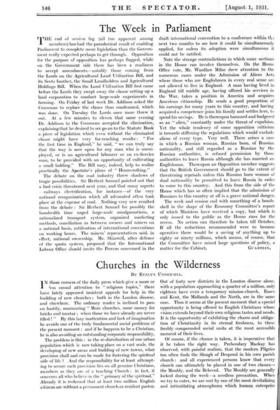The Week in Parliament
THE end of session fag (all too apparent among members) has had the paradoxical result of enabling Parliament to complete more legislation than the Govern- ment really expected perhaps to get through. Opposition for the purpose of opposition has perhaps flagged, while on the Government side there has been a readiness to accept amendments—notably those coming from the Lords on the Agricultural Land Utilization Bill, and its Scots brother, the Small Landholders and Agricultural Holdings Bill. When the Land Utilization Bill first came before the Lords they swept away the clause setting up a land corporation to conduct large-scale experiments in farming. On Friday of last week Dr. Addison asked the Commons to replace the clause thus condemned, which was done. On Tuesday the Lords once more threw it out. At a few minutes to eleven that same evening Dr. Addison in the Commons accepted the elimination, explaining that he desired to see go on to the Statute Book a piece of legislation which even without the eliminated clause might have very far-reaching results : " For the first time in England," he said, " we can truly say that the way is now open for any man who is unem- ployed, or is an agricultural labourer or an ex-Service man, to be provided with an opportunity of cultivating a small holding." The Bill may, indeed, help to realize practically the Spectator's plans of " Homecrofting."
The debate on the coal industry threw shadows of tragic possibilities. Sir Herbert Samuel pointed out that a bad crisis threatened next year, and that many aspects —railways electrification, for instance—of the very national reorganization which all advocated often took place at the expense of coal. Nothing very new resulted from the debate : Sir Herbert Samuel for possibly the hundredth time urged large-scale amalgamations, a rationalized transport system, organized . marketing methods, conciliation as between owners and miners on a national basis, ratification of international conventions on working hours. The miners' representatives said, in effect, national ownership. Mr. Shinwell, after defence of the quota system, proposed that the International Labour Office should invite the Powers concerned in the draft international convention to a conference within th- next two months to see how it could be simultaneously applied, for unless its adoption were simultaneous it could not be ratified.
Note the strange contradictions in which some sections in the House can involve themselves. On the Home Office vote, Mr. Wardlaw Milne drew attention to the numerous cases under the Admission of Aliens. Acts where those who are Englishmen in every real sense are not allowed to live in England. A man having lived in England till middle age, having offered his services in the War, takes a position in America and acquires American citizenship. He sends a good proportion of his earnings for many years to this country, and having acquired a competence joins his family and settles here, to spend his savings. He is thereupon harassed and badgered as an " alien," constantly under the threat of expulSion. Yet the whole tendency of some oppoSition criticism is towards stiffening the regulations which would exclude aliens of every type. Very well. There arises a case in which a Russian woman, Russian born, of Russian nationality, and still regarded as a Ruisian by the Russian authoritieS, is refused permisSion by those authorities to leave Russia although she has married an Englishman. Thereupon an Opposition member suggests that the British Government should go to the extent of threatening reprisals unless this Russian born woman of dual nationality be permitted to leave Russia in order to come to this country. And this from the side of the House which has so often implied that the admission of Russians to this country at all is a grave national danger.
The week and session end with something of a bomb- shell in the shape of the Economy Committee's report of which Ministers have received a copy, but which is only issued to the public as the House rises for the recess. No action can therefore be taken till *October. If all the reductions recommended were to become operative there would be a saving of anything up to eighty or ninety millions, which means, of course, that the Committee have raised large questions of policy, a


































 Previous page
Previous page